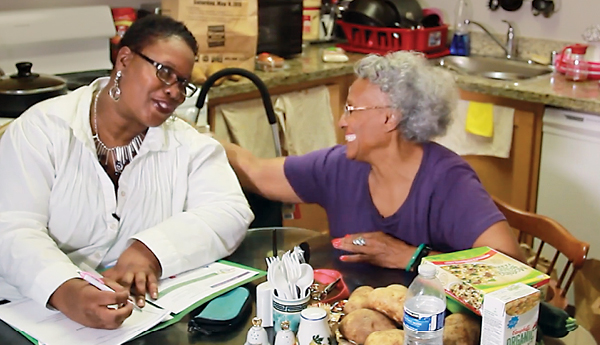
Partnering with diverse communities, improving advanced-illness care
Ruby Blackson recounts the physical and health setbacks she has experienced in her 71 years. Breaking her ankle in 2000, getting shot in 2004 and suffering seven strokes, the Hayward, California, native relishes time spent with one woman in her community.
“I have relied on Theresa more than anybody,” Blackson says. “If my health gets any worse, I know she’ll be there for me.”
Theresa Powell has no formal health training. But she joined a novel, person-centered, faith-based intervention that serves predominantly African-American adults by helping them with advanced illness care. Powell is a care navigator, someone who provides personal guidance to caregivers and those needing care as they manage a health condition or move through the health care system.
“I feel privileged to be able to help. I don’t take it for granted,” Powell says.
The Advanced Illness Care Program, a collaboration between the Betty Irene Moore School of Nursing at UC Davis, the Alameda County Care Alliance (ACCA) and Public Health Institute took a major step forward this year with a $600,000 grant from the Rita and Alex Hillman Foundation Innovations in Care Program.
Five African-American hub churches began the initiative, which has expanded to an additional seven churches in Alameda and Contra Costa counties. Seven care navigators and six care liaisons now work with congregation members from the original team of eight, and more than 550 members have participated.
“This program capitalizes on the strengths of partner organizations to increase the alignment between end-of-life goals and the care received,” says Rachael Watman, vice president of programs at the Hillman Foundation. “Looking forward, the data collected to date and ongoing evaluation will be used to develop a blueprint to scale and sustain the model across the U.S.”
School of Nursing Associate Professor Janice Bell serves as principal investigator to evaluate the curricula. She and her team have conducted in excess of 100 telephone surveys and interviewed more than 20 people.
“This program incorporates and builds on the insights and strengths of nursing science, and holds great promise as a transformative care model for future replication,” Bell explains.
“African-American families typically care for frail and older members at home more often compared to other groups, in circumstances often financially constrained, overwhelming and stressful for caregivers,” adds the Rev. Cynthia Carter-Perrilliat, co-principal investigator and ACCA executive director.
Powell says being there for someone to lean on is the reward.
“When it comes to Theresa, all I have to tell her is that I need something and she asks what,” Blackson says. “She cares about me and wants me to get better.”

